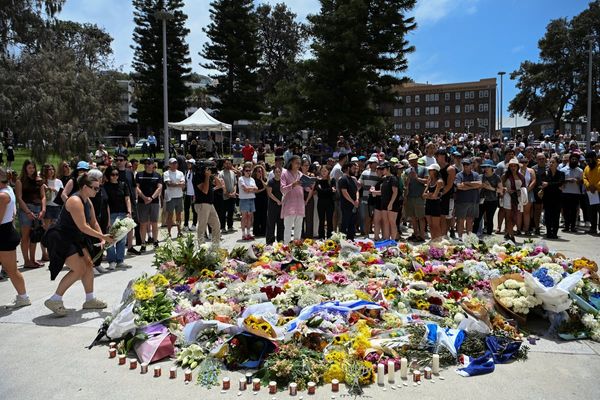
The netting strung across the ceiling sags where, two months ago, it caught chunks of plaster and broken ceiling tiles.
Pink vinyl flooring covers the basement stairwell where the boy’s body was brought up and shown to a shocked congregation — and the world.
There’s nothing in the sanctuary of Roberts Temple Church of God in Christ at 40th and State streets that would tell a first-time visitor that this is the place where 14-year-old Emmett Till’s mutilated body lay in an open casket after he was murdered in Mississippi for allegedly whistling at a white woman.
But on Thursday, some of Illinois’ congressional delegation, a host of pastors and Till’s cousin, the Rev. Wheeler Parker Jr., gathered outside the church to announce plans to introduce a bill to establish the church as a national historic site — potentially freeing up money to restore the 101-year-old building.

“The purpose of the National Historic Site is to preserve, protect and interpret for the benefit of present and future generations,” reads part of the proposed U.S. House bill.
“Mom and Dad didn’t bring us to the church to see it, but Dad made a scrapbook out of the newspapers and Jet magazine,” said Cleven Wardlow Jr., the church’s pastor, who was 11 years old at the time of Till’s funeral. “And when I saw it, I was kind of glad he didn’t bring us.”

If the bill passes, the church’s upkeep and renovation would be overseen by the National Park Service.
Parker, Till’s cousin and best friend, was with Till, who was from Chicago, in Mississippi and in the room when he was abducted. Till’s kidnapping and lynching in 1955 became a catalyst for the Civil Rights Movement.
Parker was outside the church Thursday, but he was inside during Till’s service.
“I had no ill will, animosity or hate [back in 1955] because I said, ‘This is not him, and I’ll see him again,’” Parker recalled Thursday.

Parker said making the church a national historic site will help draw visitors from across the globe.
“You’ll see a lot of foreigners come in and visit this site because it was a worldwide, significant event,” Parker said.
For Rep. Danny Davis, D-Ill., who is introducing the bill, a historic site is about, well, preserving history.
“History is so important because it gives you so much of an understanding of how things got to be the way they are. They didn’t just fall out the sky or come from a Cracker Jack box,” he said.








